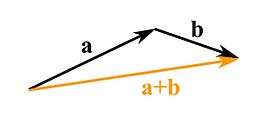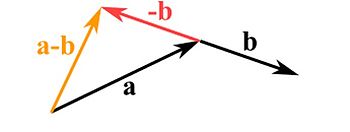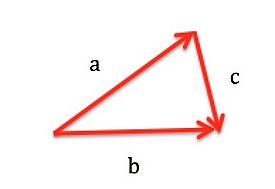Vectors: Difference between revisions
| Line 59: | Line 59: | ||
What is the magnitude of the vector C = A - B if A = <6, 21, 17> and B = <12, 7, 15>? | What is the magnitude of the vector C = A - B if A = <6, 21, 17> and B = <12, 7, 15>? | ||
A - B = <math> <6-12, 21-7, 17-15> = <-6, 14, 2> </math> | A - B = <math> <6-12, 21-7, 17-15> = <-6, 14, 2> = C</math> | ||
<math>\sqrt{(-6)^2 + 14^2 + 2^2} = 15.36</math> | |||
===Difficult=== | ===Difficult=== | ||
Revision as of 14:36, 4 December 2015
Written by Elizabeth Robelo
The Main Idea
A vector is an object with a magnitude and a direction. The magnitude of a vector is a scalar. A vector is represented by an arrow. The length of the arrow is the vector’s magnitude and the direction the arrow points is its direction. The start of the arrow is called the tail. The end where the arrow head is located is called the head.
Vectors can be added and subtracted to each other. To add two vectors you put them head to tail. The connecting arrow starting from the tail of one to the head of the other is the new vector.

To subtract two vectors reverse the direction of the one you want to subtract and continue to add them like shown before.

A unit vector is a vector that points in the same direction as the original vector with magnitude 1. We usually designate the unit vector with a "hat" [math]\displaystyle{ {\hat{\imath}} }[/math]. The unit vector is often called the normal vector.
A Mathematical Model
Vectors are given by x, y, and z coordinates. They are written in the form [math]\displaystyle{ A = \lt x, y, z\gt or xi + yj - zk. }[/math]
Magnitude: [math]\displaystyle{ |A| = \sqrt{x^2 + y^2 + z^2} }[/math]
Addition of two vectors: [math]\displaystyle{ {\lt a1, a2, a3\gt + \lt b1, b2, b3\gt } = {\lt a1 + b1, a2 + b2, a3 + b3\gt } }[/math]
Unit Vector: :[math]\displaystyle{ \mathbf{\hat{u}} = \frac{\mathbf{u}}{\|\mathbf{u}\|} }[/math]
A Computational Model
How do we visualize or predict using this topic. Consider embedding some vpython code here Teach hands-on with GlowScript
Examples
Be sure to show all steps in your solution and include diagrams whenever possible
Simple
Which of the following statements is correct?

1. [math]\displaystyle{ \overrightarrow{c} = \overrightarrow{b} + \overrightarrow{a} }[/math]
2. [math]\displaystyle{ \overrightarrow{a} = \overrightarrow{b} - \overrightarrow{c} }[/math]
3. [math]\displaystyle{ \overrightarrow{a} = \overrightarrow{b} + \overrightarrow{c} }[/math]
4. [math]\displaystyle{ \overrightarrow{b} = \overrightarrow{a} + \overrightarrow{c} }[/math]
The answer is 2 because
Middling
What is the magnitude of the vector C = A - B if A = <6, 21, 17> and B = <12, 7, 15>?
A - B = [math]\displaystyle{ \lt 6-12, 21-7, 17-15\gt = \lt -6, 14, 2\gt = C }[/math]
[math]\displaystyle{ \sqrt{(-6)^2 + 14^2 + 2^2} = 15.36 }[/math]
Difficult
What is the unit vector in the direction of the vector <12, -15, 9>? First you have to find the magnitude of the vector given: [math]\displaystyle{ \sqrt{12^2 + (-15)^2 + 9^2} = 180 }[/math]
Finally divide the vector by its magnitude to get the unit vector: [math]\displaystyle{ \frac{{\lt 12,-15,9}{180}} }[/math]
Connectedness
- How is this topic connected to something that you are interested in?
- How is it connected to your major?
- Is there an interesting industrial application?
History
Giusto Bellavitis abstracted the basic idea of a vector in 1835 when he established the concept of equipollence. He called any pair of line segments of the same length and orientation equipollent. He found a relationship and created the first set of vectors.
The name vector was given to us by William Rowan Hamilton as part of his system of quaternions. The vectors he used were three dimensional.
Several other mathematicians developed similar vector systems to those of Bellavitis and Hamilton in the 19th century. The system used by Herman Grassman is the one that is most similar to the one used today. He thought of ideas similar to the cross product and vector differentiation.
See also
Are there related topics or categories in this wiki resource for the curious reader to explore? How does this topic fit into that context?
Further reading
Books, Articles or other print media on this topic
External links
References
This section contains the the references you used while writing this page